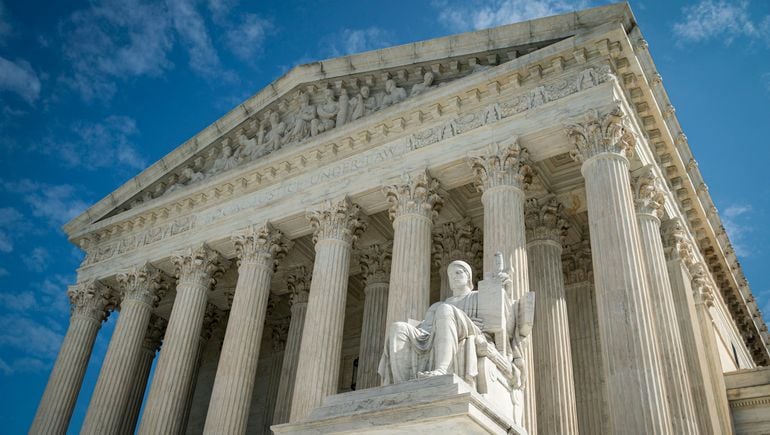The higher education world was rocked by court decisions last year, including the U.S. Supreme Court’s landmark ruling against race-conscious admissions.
This year looks to be no different, with courts poised to make similar waves.
Colleges are facing a flurry of lawsuits, including another challenge to race-conscious admissions. Higher education groups have also sued the Biden administration over controversial new regulations intended to protect borrowers.
And the Supreme Court could soon weigh in again on the Deferred Action for Childhood Arrivals program, which protects undocumented immigrants from deportation and authorizes them to study and work.
Below, we’re rounding up five lawsuits that could further change the higher education landscape.
Students for Fair Admissions v. U.S. Military Academy at West Point
Students for Fair Admissions, the anti-affirmative action group that successfully challenged race-conscious admissions practices at public and private universities before the Supreme Court, is now targeting military academies.
That’s because the Supreme Court’s ruling last June carved out an exception for these colleges. In a footnote in his majority opinion, Chief Justice John Roberts said the ruling did not address military academies’ use of race-conscious admissions, as they have “potentially distinct interests” from other higher education institutions.
Just a few months later, SFFA sued the U.S. Military Academy at West Point. The group argues the academy has “no justification for using race-based admissions,” noting those practices are now unconstitutional for all other public colleges.
Earlier this month, U.S. District Judge Philip Halpern denied SFFA’s request to temporarily block West Point from using race-conscious admissions, writing that doing so could require the academy to withdraw appointments that it had already offered this cycle.
SFFA has since appealed the decision. The group is also suing the U.S. Naval Academy over its race-conscious admissions practices.
Federal Trade Commission v. Grand Canyon Education
In December, the Federal Trade Commission sued Grand Canyon University and its educational services providera company that provides educational services for the institution. The FTC accused the university of deceiving students about the cost of its doctoral programs and misrepresenting itself as a nonprofit college.
Grand Canyon University has roughly 118,000 students, the majority of whom attend online. It pays 60% of its tuition and fee revenue to Grand Canyon Education — the company named in the FTC’s lawsuit — in return for services like marketing, recruitment and student counseling.
The FTC’s lawsuit escalates federal scrutiny over the Phoenix-based Christian university, which has accused federal agencies of coordinating a campaign against it. Grand Canyon University is also facing a $37.7 million fine from the U.S. Department of Education, which made similar allegations about its doctoral programs.
When Grand Canyon University appealed the Education Department’s fine, President Brian Mueller stressed that the institution does not mislead students about the cost of its doctoral programs. The university has pointed to a 2021 accreditor review, which said the institution provides “prospective students a clear picture of their academic and financial path toward a degree.”
The FTC’s lawsuit also ramps up the legal battle over Grand Canyon University’s nonprofit status. While the IRS and the state of Arizona consider the institution a nonprofit, the U.S. Department of Education treats it as a for-profit college for purposes of Title IV federal financial aid.
The Education Department has argued the university’s contract with Grand Canyon Education, the institution’s former parent company, is primarily intended to drive shareholder value.
Grand Canyon University sued the Education Department in 2021 over its decision. It argued that its accreditor and the IRS had signed off on its nonprofit status and that the department had overstepped its authority by refusing to do the same.
A federal judge ruled against the university in late 2022, and it has since appealed. Oral arguments over the matter are scheduled for later this month at the 9th U.S. Circuit Court of Appeals.
Career Colleges and Schools of Texas v. U.S. Department of Education
Last year, a federal appeals court temporarily blocked the Biden administration’s new borrower defense rules, which clear debts for students misled by their colleges. The court also blocked new regulations governing closed-school loan discharges.
Career Colleges and Schools of Texas, which represents for-profit institutions in the state, brought the lawsuit.
The group has argued that the Biden administration is attempting to carry out mass loan forgiveness through the new rules while having colleges foot the bill for the debt write-offs. It takes issue with provisions in the regulations that allow the Education Department to seek recoupment for loan discharges, arguing that Congress hasn’t given the agency that power.
Oral arguments were heard in November.
In court documents, the Education Department has argued that the Texas group is seeking to thwart “much-needed regulatory improvements” to address the large influx of claims that began in 2015, when a large for-profit chain abruptly collapsed.
American Association of Cosmetology Schools v. U.S. Department of Education
The American Association of Cosmetology Schools, a trade organization, sued the Education Department in December over its new gainful employment rule. The rules, which take effect in July, require career education programs to prove that their graduates earn enough to pay off their loans and make more than those who only have a high school degree.
Colleges that fail these tests may lose access to federal financial aid, a fatal blow to many institutions.
The association argues that the rule uses flawed metrics that don’t properly account for the income of tipped workers, such as beauticians. Unless the Education Department fixes those issues, cosmetology schools will be unfairly penalized, it argued.
State of Texas v. USA
In October, a federal judge ruled that DACA was unlawful, though he didn’t mandate an immediate end to the program. The federal government is allowed to continue to process DACA renewals but cannot accept new applications.
In his ruling, U.S. District Judge Andrew Hanen took issue with the rule released in 2022 by the U.S. Department of Homeland Security to replace the Obama-era memo that created the DACA program. He said the new rule suffered from “the same legal impediments” that beset the original program and argued that only Congress could approve a program like DACA.
The Biden administration filed a notice in November saying it plans to appeal the ruling, and experts predict the fate of DACA will once again fall to the Supreme Court.
In 2020, the Supreme Court ruled against the Trump administration’s plan to immediately dismantle the program. However, the ruling only determined the administration hadn’t gone through the proper steps to end the program — it didn’t decide “whether DACA or its rescission are sound policies,” Roberts wrote in the majority opinion.


